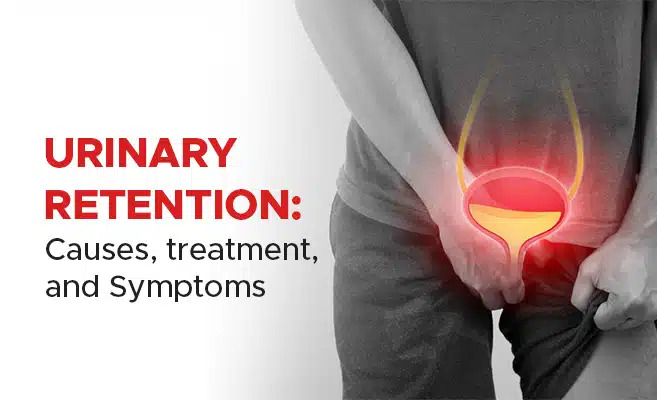Urinary Retention: Causes, Treatment, and Symptoms

Urinary retention, a condition where the bladder fails to empty properly, can be both frustrating and uncomfortable. Understanding its causes and treatments is key to effective treatment. From anatomical abnormalities to neurological disorders, a range of factors can contribute to urinary retention.
Identifying the symptoms, such as persistent urge and difficulty urinating, is crucial for early intervention. Fortunately, treatment options, including catheterization, medication, and surgery, are available. Join us on this journey as we unravel the mysteries of urinary retention, offering insights into its causes, symptoms, and the hope for the relief it brings.
Understanding Urinary Retention
Urinary retention means that you have trouble completely emptying your bladder. This can happen suddenly or slowly over time. When it happens suddenly, it is called acute urinary retention, and it requires immediate medical attention. If it develops gradually, it is called chronic urinary retention, which can cause long-term problems if not treated.
Your bladder is a hollow organ located in your lower abdomen. It stores urine until you are ready to go to the bathroom. When you urinate, the muscles in the bladder wall contract to push the urine out through a tube called the urethra, which connects the bladder to the outside of your body. When there is a problem with the muscles, nerves, or other structures involved in urination, it can lead to symptoms of urinary retention.
Urinary Retention Symptoms
The symptoms of urinary retention can vary depending on the severity of the condition. Some common urinary retention symptoms include:

- Difficulty starting to urinate
- Weak urine stream
- Dribbling after urination
- Feeling like the bladder is still full after urination
- Pain or discomfort in the lower abdomen or back
- Urinary tract infections
You should visit the PSRI Hospital, the best urology hospital in Delhi, which can help you recognize urinary retention symptoms and give the required treatment.
Causes of Urinary Retention
Urinary retention can be caused by a variety of factors, including:
- Enlarged prostate: This is one of the most common urinary retention causes in men. As the prostate gland grows, it can press against the urethra, making it difficult to urinate.
- Bladder stones: These are hard deposits of minerals that form in the bladder and can block the flow of urine.
- Urinary tract infections: These can cause inflammation and swelling in the bladder, making it difficult to urinate.
- Medications: Certain medications, such as antihistamines, decongestants, and muscle relaxants, can interfere with the muscles that control urination.
- Nerve problems: Damage to the nerves that control the bladder can interfere with urination.
Types of Urinary Retention – Acute and Chronic
Urinary retention comes in two types: acute and chronic.
- An unexpected inability to urinate, known as acute urine retention, can be extremely painful and uncomfortable.
- Numerous conditions, such as an enlarged prostate, bladder stones, urinary tract infections, drugs, or nerve issues, might contribute to it.
- Chronic urinary retention is a chronic problem that gradually worsens over time.
- Underlying medical diseases such as nerve damage, diabetes, or issues with the prostate may be the cause. Chronic urinary retention can result in kidney damage, urinary tract infections, and bladder damage if untreated.
Diagnosis of Urinary Retention
Urinary retention will be identified by a physical examination by your doctor, who will additionally ask about your health history and symptoms. They could also run a number of tests, like:
- Urine tests: These can help detect signs of infection or other underlying medical conditions.
- Bladder scan: This is a non-invasive test that uses ultrasound to measure how much urine is left in the bladder after urination.
- Urodynamic testing: This involves inserting a small tube into the bladder to measure how well it is functioning.
Urinary Retention Treatment
The treatment options for urinary retention depend on the condition’s underlying cause. Acute urinary retention is a medical emergency that requires immediate treatment, such as catheterization to drain the bladder. Medications, bladder training exercises, or surgery may treat chronic urinary retention.
Prevention of Urinary Retention
There are several things you can do to prevent urinary retention, such as:
- Drinking plenty of fluids to stay hydrated
- Maintaining a healthy weight
- Doing pelvic floor exercises to strengthen the muscles that control urination
- Treating underlying medical conditions that can cause urinary retention, such as prostate problems or diabetes
Managing Urinary Retention Treatment at Home
If you have chronic urinary retention, there are several things you can do at home to manage your symptoms. These include:
- Drinking plenty of fluids to stay hydrated
- Urinating on a regular schedule, even if you don’t feel the urge
- Doing pelvic floor exercises to strengthen the muscles that control urination
- Avoiding caffeine, alcohol, and spicy foods, which can irritate the bladder.
Causes of Urinary Retention in Females
Urinary retention can occur in both men and women, but it is more common in men due to prostate problems. In women, urinary retention can be caused by a variety of factors, including:
- Pelvic organ prolapse: This is a condition in which the pelvic organs, such as the bladder, uterus, or rectum, sag or bulge into the vagina.
- Uterine fibroids: These are noncancerous growths that develop in the uterus and can press against the bladder or urethra.
- Pregnancy and childbirth: These can cause temporary damage to the nerves and muscles that control urination.
When to See a Doctor for Urinary Retention
If you are experiencing urinary retention symptoms, such as difficulty urinating or pain in the lower abdomen, visiting the best hospital in Delhi is important. Acute urinary retention is a medical emergency that requires immediate attention, while chronic urinary retention can lead to long-term complications if left untreated.
Conclusion
Urinary retention is a medical condition that can cause discomfort, pain, and other complications. If you are experiencing symptoms of urinary retention, it is important to see a doctor for proper diagnosis and treatment.
So if you are looking for the best advice or urinary retention treatment, go nowhere other than PSRI Hospital. It is the famous Delhi multispeciality hospital where you can get the required treatment given by expert urologist in delhi. Get in touch with the team to know more.
FAQs
Q. 1 When should I seek medical attention for urinary retention?
Ans: If you experience urinary retention symptoms, such as persistent difficulty urinating or an inability to empty your bladder, it is important to seek medical attention promptly.
Additionally, suppose you have sudden and severe pain in the lower abdomen or lower back accompanied by an inability to urinate. In that case, it may indicate a medical emergency and immediate medical care should be sought.
Q. 2 Are there any complications associated with urinary retention?
Ans: Yes, urinary retention can lead to several complications if left untreated. The accumulation of urine in the bladder can increase the risk of urinary tract infections, bladder stones, and bladder damage. In severe cases, it may result in kidney problems or urinary incontinence.
Q. 3 Can urinary retention be prevented?
Ans: While it may not be possible to prevent all cases of urinary retention, some steps can help reduce the risk. Maintaining good bladder habits, such as emptying the bladder regularly and fully, avoiding excessive fluid intake before bedtime, and practicing pelvic floor exercises, can promote healthy bladder function.
It is also essential to address underlying medical conditions promptly and follow any recommended treatment plans to minimize the risk of urinary retention.
Q. 4 What are some urinary retention causes?
Ans: Urinary retention can be caused by various factors, including prostate enlargement, urinary tract infections, medication side effects, nerve damage from conditions like spinal cord injuries or multiple sclerosis, and bladder muscle weakness. Anatomical abnormalities and certain medications can also contribute to the condition.

 Book An Appointment
Book An Appointment Virtual Consultation
Virtual Consultation





